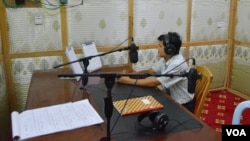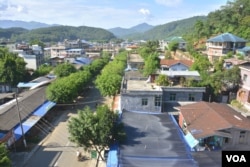Inside his small studio, Maram Bawk La adjusts a playlist of Kachin-language songs on his computer and checks the microphone to prepare for a broadcast of the Laiza FM radio station. The simple set up, with its bright red carpet, improvised soundproof walls and basic studio equipment, belies its impact.
Connected to a powerful radio transmitter with a broadcast radius of about 200 kilometers, the studio airs 10 hours a day from Laiza, a border town and Kachin rebel stronghold on the mountainous Myanmar-China border. It reaches much of Kachin State and northern Shan State, where many ethnic Kachin people tune in to get the rebels' take on their restive region.
"Our Laiza FM is popular," said Maram Bawk La, a tech-savvy young man who manages the radio station.
"We reach 80 percent of the Kachin population," claimed his boss, Lt. Col. Naw Bu, who heads the Kachin Independence Army (KIA) News and Information Department.
Laiza FM was created in October 2012, shortly after a 17-year-old cease-fire between the 10,000-strong KIA and the Myanmar army collapsed. Its purpose is to allow the rebels to communicate with the roughly 700,000 Kachin, most of whom live in government areas, far from the border region under rebel control. About 100,000 civilians were displaced by the conflict, which has recently intensified.
"It was set up to bring the real news to the Kachin public and to share knowledge," said Naw Bu.
He explained the station broadcasts international and domestic news, as well as KIA news updates on the region, Kachin songs, and informative discussions on such topics as public health. His department also runs a news website, kachinnet.net, and Laiza TV, though the latter can only be viewed in the town of Laiza.
A popular station
The Kachin have long resented central government control over Kachin State and suffered severe repression during decades of army rule. They make up less than half of the population in the state, but local-language media was banned until a few years ago, and expressions of Kachin nationalism remain sensitive.
Many people support the KIA's demands for federal autonomy and are keen listeners of Laiza FM, according to Brang Mai, CEO of Myitkyina News Journal, a private publication in the state capital Myitkyina.
"They use their own language, so most local people love to listen to that," he said. "The other reason is that the people want to see (political) changes… and they can get all sorts of sensitive information on the border areas and the fighting." He added that improved mobile phone internet was reducing the importance of Laiza FM as an outlet for such information.
"When I look at my family members and my neighbors, they are really happy when they can listen in their own language to Laiza FM, especially the music section," said Aung Aung, a nongovernmental organization worker in Myitkyina. "And the news they transmit is reliable from my observation."
Because Laiza FM keeps its listeners informed of the fighting, many Kachin know that clashes have intensified in recent months after the Myanmar army launched a major offensive to capture a strategic mountain about 30 km north of Laiza. In recent days, heavy fighting has broken in nearby Shan State, after the KIA and other rebel groups attacked police stations near Muse, Myanmar's main border crossing with China.
"I watch Laiza TV and I get information from the radio," said Hkawn Ja, a 41-year-old housewife in Laiza. "I worry that the Burmese troops will come to Laiza. In church we pray; we believe God will bless our soldiers."
Army radio strikes back
Realizing it was losing the battle over the airwaves to shape Kachin public opinion, the Myanmar army set up Thazin FM radio station in 2013 in the sprawling Northern Command complex in Myitkyina. Thazin FM broadcasts Kachin-language programs seven hours a day, and it tries to jam the signal of Laiza FM by occupying the same frequency: 89.5 MHz.
"Our listeners have to tune in very carefully," Maram Bawk La said with a smile, adding that, despite this, few Kachin would mistakenly listen to Thazin FM.
"They have propaganda, only the Burmese side of events. We have a little propaganda and a lot of news for the people. Laiza FM has the old Kachin songs and patriotic songs, but Thazin FM has no songs like this. Everybody knows the difference," he said. "Our FM has more listeners"
Brang Mai, of the Myitkyina News Journal, agreed: "Thazin FM uses our ethnic language, but most of the Kachin people clearly see that Thazin FM is a sort of propaganda from the military side. So most people ignore it."






